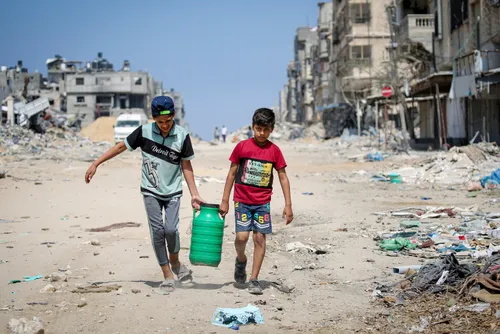
Upon reaching the six-month mark, the Israeli-led massacre of Palestinians in the Gaza Strip kills or injures a child every ten minutes, according to Tess Ingram, head of communications at Unicef, the UN children’s agency.
She said during a press conference in Geneva, Switzerland, that more than 12,000 children have been attacked by Israel since October 7, and this number is “almost certainly an underestimate.”
“From devastating injuries suffered in airstrikes to the trauma of being caught up in violent clashes, their stories paint a harrowing picture of the human consequences of the conflict,” Ingram said after spending two weeks in the Palestinian territory.
The Unicef representative said many of these injured children are often left to “waste away in pain”. She says there is an urgent need to increase the number of medical evacuations to facilitate access to adequate care.
“With a child killed or injured every 10 minutes, more than anything else, we need a ceasefire,” Ingram said.
Illness
The NGO International Rescue Committee (IRC) said in a statement that the Israeli massacre decimated Gaza’s health system and the population today faces “hunger, malnutrition and outbreaks of infectious diseases.”
Projections made by international entities such as the London School of Hygiene and Tropical Medicine and the Johns Hopkins Center for Humanitarian Health indicate that, even with an immediate ceasefire, around 12,000 people would die in Gaza as a result of disease, the statement said.
“No hospitals in Gaza are fully functioning anymore. IRC staff and partners in Gaza continue to witness the devastation of what health facilities remain,” said Dr. Seema Jilani, IRC’s senior technical health advisor for emergencies.
“Although there have been no large-scale epidemics in Gaza for more than a decade, the population is now vulnerable to infectious diseases such as influenza, COVID, pneumonia, bacterial dysentery, cholera, polio, measles and meningitis,” he added.
The IRC reiterated its call for an immediate ceasefire and unfettered access to aid to prevent the total collapse of public health in the besieged Gaza Strip.
Fome
The UN Palestinian refugee agency (UNRWA) said the amount of aid entering Gaza did not increase in April despite global appeals, with an average of 181 trucks arriving in the enclave daily.
This volume is far below the operational capacity of Gaza’s open border crossings and does not meet Israel’s stated target of facilitating the entry of 500 aid trucks per day, UNRWA said.
The flow of aid to northern Gaza, where famine is most widespread, has been especially strained, with UNRWA unable to reach the area since January 23, the agency added.
Across the Gaza Strip, “food insecurity” has increased by 80% since December, UNRWA said.
Context
The current Israeli massacre in the Gaza Strip — or military operation, as Israel calls it — began in October last year, but conditions in the Palestinian territory were already considered “suffocating” by the UN before that.
The 17-year Israeli blockade — to force Hamas, the party that won the Palestinian elections in 2006, to abdicate power — generated unemployment rates of 45% and food insecurity that affected 64% of the population. The UN estimated that more than 80% of Gaza residents depended on foreign aid to survive.
On October 7, members of Hamas entered Israel and carried out the most violent attack ever suffered by the country, leaving around 1,200 dead and capturing 240 hostages. The Netanyahu government’s response was considered disproportionate by the international community. Daily bombings in what is considered one of the most densely populated territories in the world have caused the deaths of tens of thousands of Palestinians and destroyed the entire infrastructure of Gaza.
The number of fatalities exceeded 33 thousand Palestinians — around 70% women and children —, with more than 8 thousand people missing under the rubble. 35% of the buildings were destroyed and practically all of the more than two million inhabitants were forced to leave their homes.
In the other occupied Palestinian territory, the West Bank, illegal violence carried out by Israeli settlers is daily, with more than 500 deaths. Since the start of the conflict, thousands of Palestinians have been arrested and the government has announced that thousands more will be detained this year.
The UN warns of a humanitarian disaster, accusing Israel of using collective hunger as a weapon of war and highlighting the real possibility that hundreds of thousands of Palestinians will die due to lack of food. After much diplomatic negotiation, a resolution calling for a ceasefire in Gaza was approved at the end of March at the UN. Israel, however, did not comply with what was determined.
Editing: Matheus Alves de Almeida

Source: www.brasildefato.com.br

